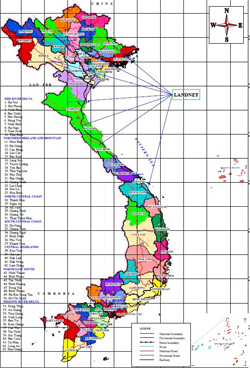In preparation for the review/assessment of forest and forestland allocation policy under the Letter 2734/BNN-TCLN dated on August 15, 2013, Vietnam Administration of Forestry, in collaboration with Social Policy Ecology Research Institute (SPERI), Consultancy on Development Institute (CODE) and Culture Identity and Resource Use Management (CIRUM) co-organized a seminar on “Inadequacies and shortcomings in policies and practice of forest and forestland allocation and post-allocation” on May 8, 2014 in Hanoi.
There were 57 people participated the seminar. They were representatives from local authorities at communal, district and provincial levels of Lang Son, Lao Cai, Nghe An, Ha Tinh, Quang Binh, Quang Nam and Kon Tum province; representatives from State management agencies such as National Assembly Office, Government Office, Central Committee for Economics, Government Committee for Ethnic Minorities, Vietnam Administration of Forestry of the Ministry of Agriculture and Rural Development, Ministry of Natural Resources and Environment and Ministry of Finance; representatives from Forest Protection Offices of Lao Cai, Lang Son, Nghe An, Quang Nam and Kon Tum provinces; scientific experts from research institutes of forestry, agriculture, and environment sectors; representatives from Vietnam Union of Science and Technology Associations and Kon Tum’s Union Science and Technology Associations; representatives from other science and technology organizations, and especially the grassroots consultants who directly involved in forest and forestland allocation programs being implemented in mountainous areas of Lang Son, Lao Cai, Nghe An and Quang Binh provinces, where forest and land overlapping between individuals, households, organizations and companies have occurred (Decree 02/1994/NĐ-CP, Decree 01/1995/NĐ-CP; Decree 163/1999/NĐ-CP, Decree 181/2004/NĐ-CP, Decree 200/2004/NĐ-CP and Joint Circular 07/2011/TTLT-BNN-BTNMT).These grassroots consultants are working for independent science and technology organizations that have worked/encountered with inadequacies/shortcomings during forest and forestland allocation implementation since 1997.
The goals of the seminar is to identify the nature and root causes of inadequacies/shortcomings in policies on forest and forestland allocation as well as between legal documents and actual implementation; and to identify why long-lasting unresolved conflicts caused by post-allocation between individuals and companies, companies and communities and between communities and State agro-forestry enterprises occur at varied localities. The seminar’s outputs are expected to provide inputs for further review and assessment for adjustment of the forest and forestland allocation policy under the Letter 2734/BNN-TCLN dated on August 15, 2013 in order to ensure the genuine reflection of ongoing situations in localities throughout the country.
Prof.PhD. Nguyen Ba Ngai, Deputy Head of the Vietnam Administration of Forestry, in the opening speech, emphasized that “forest and forestland allocation has once been seen as an effective solution for agricultural development, contributing to poverty reduction for people whose lives depend upon forest resources. After decades of policy implementation with hundreds of meetings and conferences, a question that “Has the livelihood of forest-dependent communities/people been secured?” still raises a critical challenge and remains unanswered. The answer is expected to be searched through continuous review and assessment of forest and forestland allocation over the decades of implementation by the Vietnam Administration of Forestry.
In practice, implementation of forest and forestland allocation policy has often ignored feedbacks from local authorities at communal and/or provincial levels and also lacked independent arguments and criticisms from scientific experts, especially consultancy organizations on methodology of conducting forest and forestland allocation process as well as resolving any conflicts during the allocation process (including post-allocation conflicts). Therefore, Forest Protection Bureau of the Vietnam Administration of Forestry, in collaboration with Social Policy Ecology Research Institute (SPERI), Consultancy on Development Institute (CODE) and Culture Identity and Resource Use Management (CIRUM) has decided to host the seminar on “Inadequacies and shortcomings in policies and practice of forest and forestland allocation and post-allocation”.
PhD. Doan Hoai Nam, Deputy Head of Forest Protection Bureau spoke of four (04) topics for analysis and discussion, including: (i) Forest and forestland allocation policies are inadequate, lacking consistency and synchronization; (ii) Inadequacies in the practice, while policies remain incomplete; (iii) Obstacles and difficulties in the implementation; and (iv) Good models of forest and forestland allocation and post-allocation, and feasible solutions towards better policy amendment.
The seminar welcomed different feedbacks from representatives of local authorities; the grassroots consultants who have directly faced inadequacies/shortcoming during policy implementation at the grassroot/community level; their comments and contributions would be invaluable for revising the forest and forestland allocation policy; the experts from Union of Science and Technology associations at central and provincial levels; and key farmers from areas implementing the Joint Circular 07/2011/TT/BNNPTNT-BTNMT and their lessons would help to obtain a comprehensive, realistic picture for further policy adjustments towards addressing the question “Has the livelihood of forest-dependent communities/people been secured?”
Download for details






















